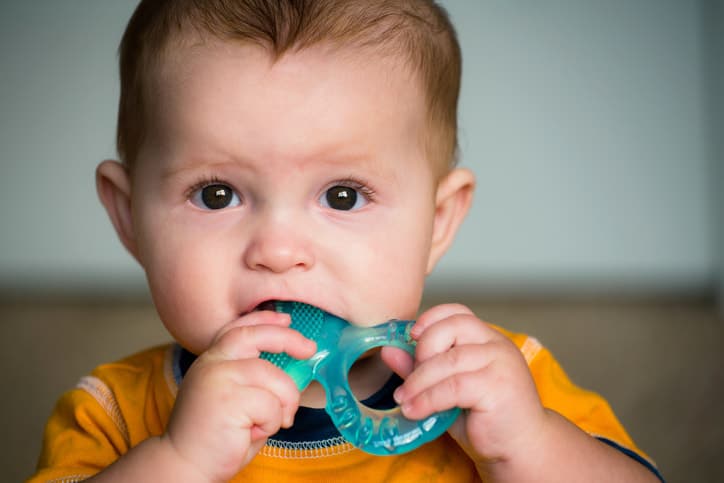For parents, there are not a lot of stages more dreaded than teething. No one wants to see their baby be uncomfortable. And, if we’re being honest, no one is excited to handle the extra grumpiness. Keep reading to learn more about teething and safe ways to find relief for your baby.
What Is Teething?
According to the Cleveland Clinic, teething (sometimes referred to as “teething syndrome”) is when a baby’s first set of teeth (baby teeth) begins to emerge from their gums. This process usually begins when a baby is 6 to 12 months old. Teething happens periodically until your baby has developed all their primary teeth (generally, by age 3). It’s important to note that not every child is the same and may experience teething earlier or later.
Signs of Teething
- Drooling
- Red gums
- Tender gums
- Swollen gums
- More cranky and fussy
- Trouble sleeping
- Chewing on objects
- Lack of or lessening of appetite
- A slight fever (if it’s over 100.4 degrees F, call the doctor)
When Can I Expect Baby Teeth To Come In?
The Cleveland Clinic notes that the first teeth to emerge are commonly the two bottom front teeth (central lower incisors). These will be followed by the top two front teeth (central upper incisors) and the bottom two lateral lower incisors. Within their first year, most babies will have eight front teeth — the ones previously mentioned and the addition of the two lateral upper incisors. By about 16 months old, most babies will begin to get their first set of four molars: two on top and two on the bottom. This is generally the worst of the teething stage. By 3, your child should have all 20 primary teeth (ten on top, ten on the bottom).
Tips To Soothe A Teething Baby
No one wants to see their baby uncomfortable and fussy. The Mayo Clinic recommends the following to help soothe your baby’s discomfort:
- Rubbing your baby’s gums with your finger
- Give your baby something cool to chew on, such as chilled teething rings, a chilled spoon, or a cold wet washcloth
- Over-the-counter children’s pain medicine
Potentially dangerous teething “remedies” to avoid:
- Teething necklaces (choking or strangling risk)
- Homeopathic teething tablets (can have harmful amounts of belladonna, which can cause trouble breathing and seizures)
- Anything containing benzocaine or lidocaine (dangerous and potentially fatal to babies)
When Is It Time To See The Dentist?
The American Dental Association (ADA) recommends that babies begin seeing a dentist as soon as their first tooth appears but no later than their first birthday. Baby teeth can still get cavities, and this helps get your child more comfortable with this very important step in keeping their oral health in check.
According to the ADA, parents should seek approval for any over-the-counter “remedies” for pain relief for teething babies, as not all products marketed to teething babies are safe. Parents should seek medical attention if their teething baby experiences any of the following symptoms as these are not a normal part of teething:
- Fever
- Diarrhea
- Rash
When Should My Child Get Their Wisdom Teeth?
Once your child has grown and lost all their baby teeth, you’re likely wondering when your child will get their wisdom teeth and whether or not they’ll need them removed. According to the ADA, wisdom teeth (the third and final set of molars) usually emerge between 17 and 21 years old. Wisdom teeth extraction is often recommended preemptively to avoid any future dental and health issues or to prepare the mouth for braces.


Regular Price:
$179
With this offer, there’s no excuse not to get back on track! Schedule a complete exam and x-rays for only $39 and ensure you have a beautiful healthy smile.
Signs and Symptoms That Wisdom Teeth May Need To Come Out
According to the ADA, the following may indicate that the wisdom teeth need to be removed:
- Pain in the gums, jaw, or back of the mouth
- Signs of infection
- One or more wisdom teeth become impacted and/or cause a cyst
- Signs of tooth decay in one or more of the back teeth
- Signs of gum disease
- Signs that wisdom teeth are causing damage to other teeth (such as a bite issue or an issue with cavity/disease spread)
If your child is near the age of getting wisdom teeth, it’s important to call the dentist and ask for their recommendation for monitoring them. Untreated wisdom teeth can cause issues with misalignment, damage the other teeth, and may be quite painful.
The journey to healthy adult teeth can be a challenge for anyone. But following these tips for finding relief doesn’t have to be quite so bad.
Sources:
Teething. (n.d.).
Teething/Teething Syndrome. (2023).
Teething: Tips for soothing sore gums. (2022).
Wisdom Teeth. (n.d.).
Your Baby’s First Dental Visit. (n.d.).
